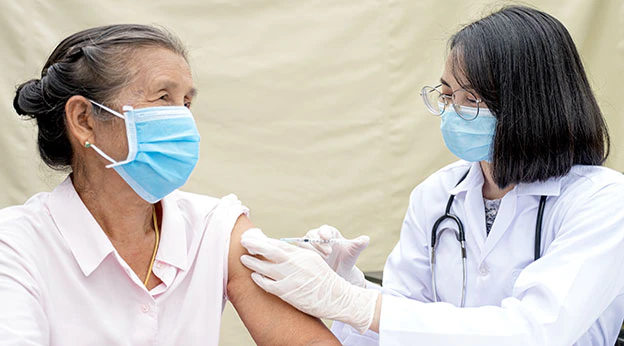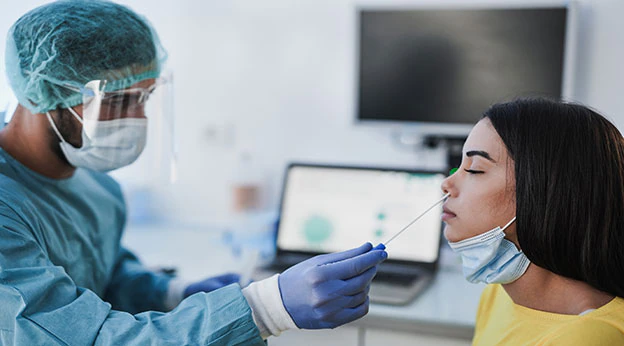This page helps uninsured individuals find no-cost COVID-19 testing, treatment, and vaccines.
- COVID-19 vaccines are 100% free for every individual living in the United States - even if you do not have insurance.
- If you do not have health insurance, talk to your health care provider to see if they will agree to bill the federal government for other COVID-19 related care, like testing and treatment.
- If you are a health care provider, learn more about this voluntary program to ensure no one is denied COVID-19 related care for financial reasons or because they are undocumented.
For patients who do not have health insurance
Talk to your provider
If you are uninsured or undocumented, talk to your provider to see if they will agree to bill the federal government for COVID-19 services so you do not have to pay any costs.
- Before your appointment, call your doctor's office and tell them you do not have insurance
- Confirm that the provider you will be seeing is willing to participate in the HRSA Uninsured program and bill the federal government, not you
What services are covered at no cost?
- COVID-19 testing (both diagnostic and antibody)
- Testing-related in-person or telehealth visits
- COVID-19 treatment and therapeutics
- Treatment-related visits at an office, via telehealth, in an emergency room, for inpatient or outpatient/observation, at a skilled nursing facility, or for long-term acute care (LTAC), rehabilitation care, and home health
- Use of medical equipment (e.g. oxygen, ventilator, etc.)
- Ambulance for emergency transportation and non-emergent transfers
- COVID-19 vaccination fees
What to do if you receive a bill?
Contact your health care provider. Providers who participate in and are reimbursed from the HRSA COVID-19 Uninsured Program for qualified COVID-19 related services rendered to you are not allowed to "balance bill," which means you should not receive a bill.
If the provider did not submit a bill for your COVID-19-related testing, and/or treatment to the HRSA COVID-19 Uninsured Program, or the care was not eligible for reimbursement from the program, you may be responsible for full payment of the bill.
Regardless of your insurance status, providers cannot charge you for the COVID-19 vaccine or administration of the COVID-19 vaccine. If you experience or witness any potential violations of this requirement you can report the matter to the Office of the Inspector General, U.S. Department of Health and Human Services, by calling 1-800-HHS-TIPS or the website TIPS.HHS.GOV.
Find providers who serve the uninsured
To help you find providers who may provide services at no cost, if you are uninsured, we have made available the list of providers who have previously participated in the HRSA uninsured program. We encourage you to call providers in your area to ask them if they are willing to participate in the program and provide you coronavirus-related care at no cost.
How to get affordable insurance?
You can shop for and enroll in health insurance at HealthCare.gov before August 15, 2021 as part of a Special Enrollment Period due to the COVID-19 pandemic. In addition, the American Rescue Plan expands eligibility so more Americans qualify for health insurance coverage and tax credits. Starting April 1, 2021, you may be able to get more savings and lower costs on Marketplace health insurance coverage.
Expanded financial assistance for affordable health insurance
The Affordable Care Act (ACA) created new opportunities for affordable health insurance coverage in Medicaid and through the Marketplace, and the American Rescue Plan (ARP) will expand financial assistance further, making millions of additional Americans eligible for Marketplace subsidies for the first time.
Under the American Rescue Plan (ARP), 14.9 million people who are currently uninsured may be eligible for Premium Tax Credits.
- Individuals with family incomes above 400 percent of the Federal Poverty Level (FPL) ($51,520 for a one-person household, $106,000 for a family of four in 2021) may now qualify for premium subsidies beginning April 1, 2021.
- An estimated 1.8 million uninsured individuals with incomes below 150% of the FPL ($19,400 for a one-person household or $39,300 for a family of four in a household) will be eligible for larger subsidies that will allow them to be covered under the benchmark silver plan for their geographic area without any premium.
For Providers
HRSA Uninsured Program
Join the collective fight to defeat this pandemic and volunteer to participate in Health Resources & Services Administration (HRSA) Uninsured Program. The HRSA Uninsured Program provides claims reimbursement to health care providers generally at Medicare rates for:
- Testing uninsured individuals for COVID-19
- Treating uninsured individuals with a COVID-19 primary diagnosis
- COVID-19 vaccine administration to the uninsured
- Delivering the services listed above to uninsured, undocumented immigrants
What services are covered for reimbursement?
- Specimen collection, diagnostic and antibody testing.
- Testing-related visits including in the following settings: office, urgent care or emergency room or telehealth.
- Treatment: office visit (including telehealth), emergency room, inpatient, outpatient/observation, skilled nursing facility, long-term acute care (LTAC), rehabilitation care, home health, durable medical equipment (e.g., oxygen, ventilator), emergency ambulance transportation, non-emergent patient transfers via ambulance, and FDA-licensed, authorized, or approved treatments as they become available for COVID-19 treatment.
- Administration fees related to FDA-licensed or authorized vaccines.
Services not covered by traditional Medicare will also not be covered under this program. In addition, the following services are excluded:
- Any treatment without a COVID-19 primary diagnosis, except for pregnancy when the COVID-19 code may be listed as secondary.
- Hospice services.
- Outpatient prescription drugs.
- All claims submitted must be complete and final.



